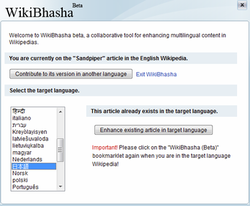Overview
WikiBhasha enables contributors to Wikipedia to find content from Wikipedia articles, translate it into other languages, and then either compose new articles or enhance existing articles in the various language versions of Wikipedia. [2] The tool acts as a simple and intuitive user interface layer that stays on the target language Wikipedia article that is being created or enhanced during the user-session. At the end of the session, all the additions or modifications of content are submitted to the target language Wikipedia in the updating process.
WikiBhasha supports content creation in more than 30 languages. It enables easy content creation in non-English Wikipedias by leveraging the large volume of English Wikipedia content as the source of information. Initially, the Wikimedia Foundation and Microsoft Research were working closely with the Wikipedia user communities focusing on content creation in Arabic, German, Hindi, Japanese, Portuguese and Spanish. The word Bhasha means language in many North Indian languages, and is related to the word Bahasa of Malaysia and Indonesia.
The software is similar to the Google Translator Toolkit used to translate Wikipedia articles since 2008. The key difference between the two is that WikiBhasha runs as an overlay within the Wikipedia interface, while the Google toolkit runs elsewhere and requires a Google account.
This page is based on this
Wikipedia article Text is available under the
CC BY-SA 4.0 license; additional terms may apply.
Images, videos and audio are available under their respective licenses.
